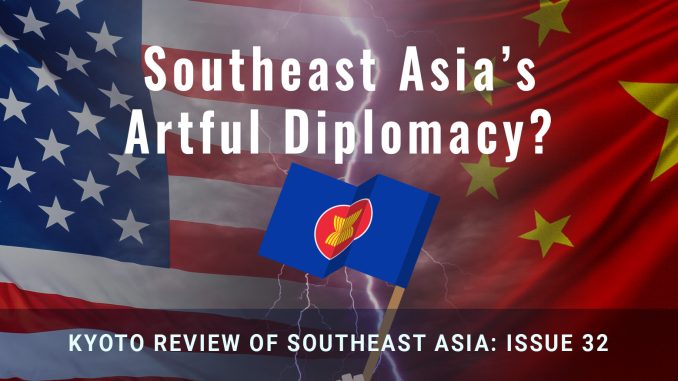
This issue of Kyoto Review of Southeast Asia presents five case studies looking at foreign policy of five Southeast Asian nations: Cambodia, Malaysia, the Philippines, Indonesia and Thailand. Five contributors examine foreign policy of their chosen country, analysing its past and future trend, as well as the linkage between domestic politics and foreign relations. At the heart of the debate however lies the intensifying rivalry between the United States and China, the impact of which has cast a long shadow over the region and its stability.
Kimkong Heng investigates the Cambodian foreign policy with a special focus on the Cambodia-US ties which have been impaired, arguably by the cosying up between Phnom Penh and Beijing. Heng suggests that the United States will continue to play a vital part in Cambodian foreign relations; hence an improvement in bilateral ties is essential. This will result in a more balanced foreign policy of Cambodia towards to two superpowers, a position well-suited small countries like Cambodia.
In the case of Indonesia, Noto Suoneto delves into the Indonesia-China cooperation in the Belt and Road Initiative. Through economic diplomacy, China has geared up its efforts in building a new economic web linking countries of Southeast Asia. The Chinese move seemed to have matched with Indonesia’s own agenda of fulfilling economic interests under the leadership of President Jokowi. But Suoneto also cautions that embracing China will be bring criticism from the opposition. Key concerns include the issue of a debt-trap, the loss of sovereignty and the entry of Chinese workers. Jokowi will need to strive for win-win cooperation for the sake of national interests as well as proving his government’s legitimacy.
Elina Noor presents the case of Malaysia and traces the past of the country’s foreign policy to determine its international standing today. Against the backdrop of the domestic dynamisms that have driven the Malaysian foreign policy has been Malaysia’ entanglement in great power politics. China continues to be perceived as a threat, given that the two countries have engaged in the disputes in the South China Sea. The emergence of the Australia-United Kingdom-United States (AUKUS) is possibly a response to the Chinese assertiveness but puts Malaysia in an anxious position. Neither the assertion of China nor the AUKUS would lead to regional stability.
The post-Duterte foreign policy is discussed by Andrea Chloe Wong. While the tilt towards authoritarianism of Duterte may have clearly affected the Philippines-US relations, the ties between the Philippines and China are somewhat more muddled. This is because Manila has relied on Beijing economically, even though political issues—for example the conflict in the South China Sea—have remained a key obstacle. But the characteristic of the Duterte administration has seemed to fit in well with the on-going illiberal trend in Southeast Asia in which China has provided a role model for illiberal regimes to thrive and survive. But will this view of China change under the new presidency?
Thailand’s relations with China, despite amicable, are dependent on the position of the United States on the kingdom and the region as a whole. Peera Charoenvatthananukul depicts China as a threat to Thai interests, both from the realist and liberal perspectives. Through realism, China is a threat to Thailand due the geographical proximity. One example is how the building of dams in Southern China has caused a serious environmental impact on the lower part of the Mekong River. From the liberal point of view, the fact that China is supporting illiberal regimes in Southeast Asia, including Thailand, is indeed a threat to democracy and thus to the Thai interests in the long run. That explains why the United States is an important factor in the Thai-Sino relationship.
While the focus is on the US-China rivalry, the key takeaways in this issue might leave us stunned. Southeast Asia remains driven by superpower politics. The US-China rivalry, despite being blown out of proportion, continues to define the international politics of Southeast Asia. Countries representing in these study cases have possessed mixed perceptions vis-à-vis both the United States and China. But as these mixed perceptions swirl, what is lost is the importance of ASEAN (Association of Southeast Asian Nations). ASEAN is superseded by the US-China rivalry. For an organisation which has prided itself for being free of foreign domination, the era of US-China competition is a serious test to such pride.
Pavin Chachavalpongpun
Associate Professor, Center for Southeast Asian Studies, Kyoto University
Editor of Kyoto Review of Southeast Asia
Editor of Issue 32
Main Articles in Seven Languages

Mending Cambodia-US relations: A Cambodian Perspective
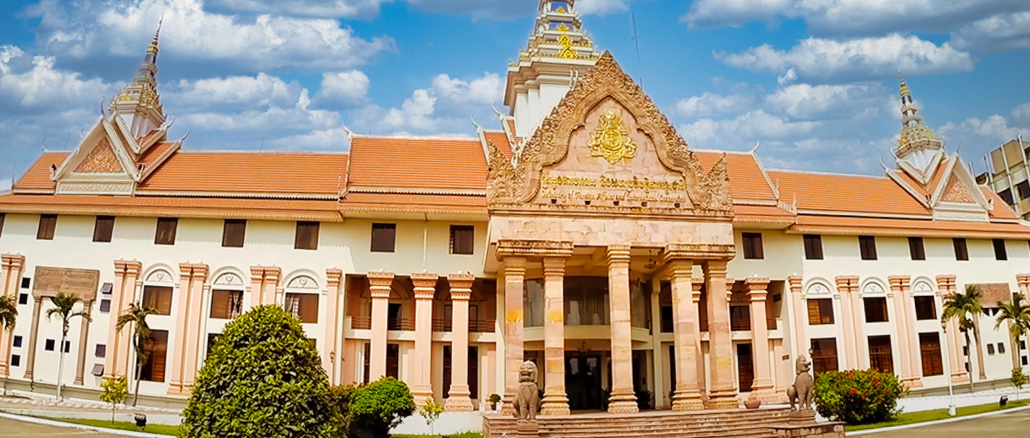
Mending Cambodia-US relations: A Cambodian Perspective
Memulihkan Hubungan Kamboja-AS: Perspektif Kamboja
ซ่อมสร้างความสัมพันธ์กัมพูชา-สหรัฐฯ : มุมมองจากฝั่งกัมพูชา
カンボジア・米国関係の修復:カンボジアの視点
Hàn gắn mối quan hệ Campuchia-Hoa Kỳ: Từ phương diện Campuchia
Pagkumpuni sa Relasyong US-Cambodia: Isang Perspektibo ng Cambodian
ကမ္ဘောဒီးယား – အမေရိကန် ဆက်ဆံရေးကို ပြင်ဆင်ခြင်း – ကမ္ဘောဒီးယားရှုထောင့်
The Political and Economic Dynamics of Indonesia-China BRI Cooperation

The Political and Economic Dynamics of Indonesia-China BRI Cooperation
Dinamika Politik dan Ekonomi Kerja Sama BRI Indonesia-Tiongkok
พลวัตทางการเมืองและเศรษฐกิจของความร่วมมือ “ข้อริเริ่มหนึ่งแถบหนึ่งเส้นทาง” ระหว่างอินโดนีเซีย-จีน
インドネシア政治・経済の動向:中国一帯一路構想(BRI)連携
Động lực chính trị và kinh tế trong hợp tác BRI của Trung Quốc và Indonesia
Ang Pampolitika at Pang-ekonomiyang Kalakaran ng Kooperasyong BRI ng Indonesia at China
အင်ဒိုနီးရှား-တရုတ် BRI ပူးပေါင်းစီမံကိန်း၏ နိုင်ငံရေးနှင့် စီးပွားရေးဆိုင်ရာ တွန်းတိုက်မှုများ
Malaysia’s Foreign Policy over the Last Four Years

Malaysia’s Foreign Policy over the Last Four Years
Saat Perubahan dan Kesinambungan Bertabrakan: Kebijakan Luar Negeri Malaysia selama Empat Tahun Terakhir
เมื่อความเปลี่ยนแปลงปะทะความต่อเนื่อง: นโยบายต่างประเทศของมาเลเซียในช่วงสี่ปีที่ผ่านมา
変化と継続が衝突する時代:過去4年間のマレーシア外交政策
Khi sự thay đổi và tính tiếp tục trùng nhau: Chính sách đối ngoại của Malaysia trong bốn năm qua
Kapag nagsalpukan ang pagbabago at pagpapatuloy: Patakarang panlabas ng Malaysia sa nakalipas na apat na taon
ပြောင်းလဲမှုနှင့် မပြောင်းလဲမှုတို့ ပွတ်တိုက်သည့်အခါ – မလေးရှားနိုင်ငံခြားရေး မူဝါဒ လေးနှစ်တာ
Philippine Foreign Policy After Duterte: Vital Considerations for the Next President
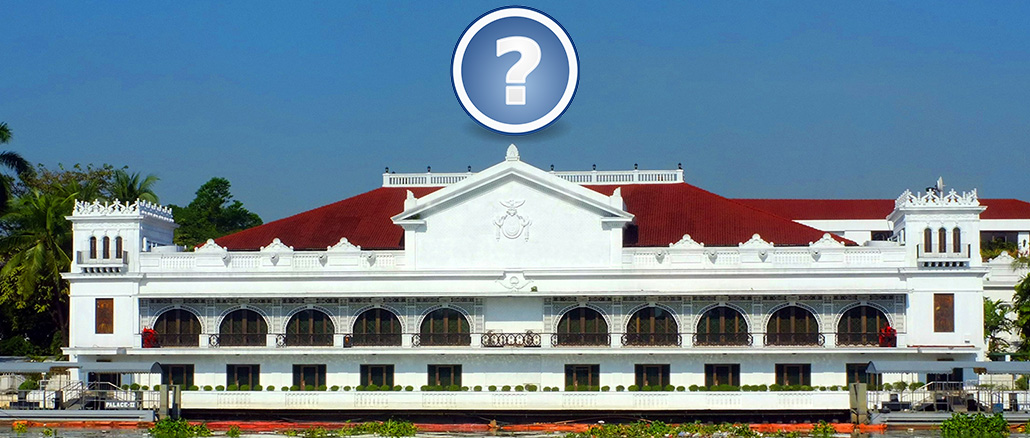
Philippine Foreign Policy After Duterte: Vital Considerations for the Next President
Kebijakan Luar Negeri Filipina setelah Duterte: Pertimbangan Penting untuk Presiden Berikutnya
นโยบายต่างประเทศของฟิลิปปินส์หลังยุคดูเตอร์เต: ข้อคำนึงสำคัญสำหรับประธานาธิบดีคนต่อไป
ドゥテルテ後のフィリピン外交政策:次期大統領が考慮するべき重要課題
Chính sách đối ngoại của Philippines sau Duterte: Những cân nhắc quan trọng cho Tổng thống tiếp theo
Patakarang Panlabas ng Pilipinas Pagkatapos ni Duterte: Mga Mahahalagang Konsiderasyon para sa Susunod na Pangulo
ဒူတာတေးအလွန် ဖိလစ်ပိုင်နိုင်ငံ၏ နိုင်ငံခြားရေး မူဝါဒ – နောက်လာမည့် သမ္မတ စဥ်းစားရမည့် အရေးကြီးအချက်များ
In China’s Pocket: A Misguided Thai Foreign Policy
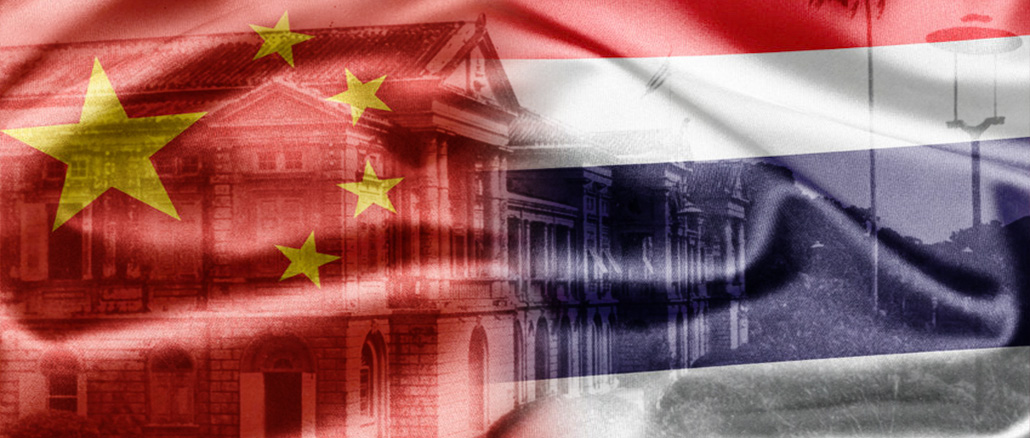
In China’s Pocket: A Misguided Thai Foreign Policy
Dalam Jeratan Tiongkok: Kebijakan Luar Negeri Thailand yang Salah Arah
ในเงื้อมเงาจีน: นโยบายต่างประเทศที่ผิดพลาดของไทย
中国の言いなり:判断を誤ったタイの外交政策
Trong túi của Trung Quốc: Chính sách đối ngoại sai lầm của Thái Lan
Sa Bulsa ng China: Naliligaw na Patakarang Panlabas ng Thailand
တရုတ်ခါးပိုက်ထဲရောက်နေသည့် တလွဲထိုင်းနိုင်ငံခြားရေးမူဝါဒ
Book Reviews
From Issue 32 Kyoto Review of Southeast Asia, (March 2022)
 Unmarked Graves: Death and Survival in the Anti-Communist Violence in East Java, Indonesia Unmarked Graves: Death and Survival in the Anti-Communist Violence in East Java, IndonesiaAuthor: Vannessa Hearman Publisher: University of Hawaii Press, 2018 Reviewed by Akihisa Matsuno |
 Traces of Trauma: Cambodian Visual Culture and National Identity in the Aftermath of Genocide Traces of Trauma: Cambodian Visual Culture and National Identity in the Aftermath of Genocide Author: Boreth Ly Publisher: University of Hawai’i Press, 2019 Reviewed by Joseph Mai |
 Passionate Revolutions: The Media and The Rise And Fall Of The Marcos Regime Passionate Revolutions: The Media and The Rise And Fall Of The Marcos Regime Author: Talitha Espiritu Publisher: Ohio University Press, 2017 Reviewed by Carmina Yu Untalan |
 90 Years in Singapore: History, Politics, and Identity 90 Years in Singapore: History, Politics, and IdentityAuthor: Irene Lim Publisher: Pagesetters Services Pte Ltd Reviewed by Walid Jumblatt Bin Abdullah |
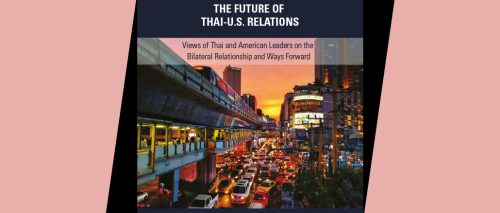 The Future of Thai-U.S. Relations: Views of Thai and American Leaders on the Bilateral Relationship and Ways Forward The Future of Thai-U.S. Relations: Views of Thai and American Leaders on the Bilateral Relationship and Ways ForwardAuthor: The Asia Foundation Publisher: The Asia Foundation, 2018 Reviewed by Thapiporn Suporn |
